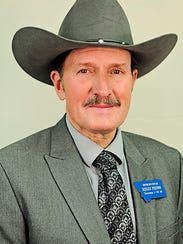Last session, the committee discussed numerous bills dealing with wolves. In the end, the Legislature passed two major wolf bills. One extended the hunting season and increased the bag limit to five. The other allowed landowners to shoot wolves that were bothering livestock.

There are still people on both sides of the wolf issue, but the lack of bills this session "does go to show we must have answered some of the concerns," Flynn said. "Two or three years ago, it was a very hot topic everywhere," said John Vore, game management bureau chief for Montana Fish, Wildlife and Parks. "The amount that we hear about wolves and wolf management has really decreased in the last couple years."
Vore guesses that is because FWP has been effective in managing wolves.
Wolf populations are down in some areas of the state and there have been fewer conflicts with livestock. "If we have problem wolves, we've taken care of those problem wolves," Vore said.
The bill that passed in 2013 allowing landowners to harvest problem wolves on their property helped ease some concerns, Flynn said. "I think that answered some questions for the livestock community," he said.
Statewide, six wolves were killed by landowners under the new law in 2014 and another wolf was killed this year. "I think it does make people feel better that they have that option," said Ty Smucker, wolf management specialist for FWP Region 4.
Landowners who shoot a wolf are required to report it to FWP within 24 hours. FWP then comes out and collects the wolf. "They can't keep the wolf," Smucker said. However, ranchers and other landowners know the chance they will see a wolf and be able to shoot it is slim, he said. Wolves are smart enough to stay away when humans are around. "Folks who have wolves on the landscape know the opportunity to do that is fairly limited," Smucker said.
However, it still gives landowners a legal option to do something when wolves become a problem, instead of the old "shoot, shovel and shut up." Because landowners have to report wolves that are killed, it helps FWP keep track of where wolves are showing up and where they're persisting.
Statewide, there is an annual quota of 100 wolves that can be killed by landowners. Some landowners still run into problems with livestock disappearing and not knowing for sure whether wolves are involved, Smucker said. But FWP works with landowners in those situations. "It seems like folks know if wolves are consistently killing livestock, we're going to figure it out and remove the problem wolves," he said.
With calving season well under way, there have been no wolf depredations so far in Region 4, Smucker said. However, there have been some elsewhere in the state. Smucker still hears concerns from hunters about wolves wiping out elk and deer populations, but 81 percent of hunting districts statewide are at or above objective. "There are still a lot of opinions and hype on both sides of the issue," Smucker said. "We certainly here different opinions from both sides, but it's not nearly as intense," said Ron Aasheim, spokesman for FWP.
FWP has made a commitment to manage wolves in a way that maintains a healthy wolf population and keeps them off the Endangered Species List. "To date, we've accomplished that," Aasheim said.
It will take many more years to know whether current wolf management laws are a good long-term solution, Flynn said. "You never know if a potential solution will work until it lasts for a considerable period of time, but in the short hall it looks like a good stop-gap solution," he said.
source



No comments:
Post a Comment